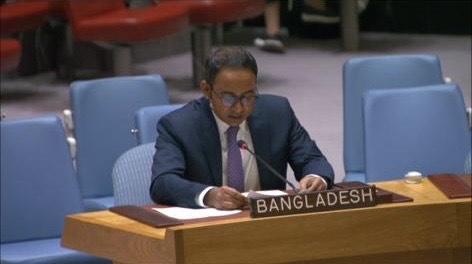Mr. President,
I congratulate China for assuming the Presidency of the Security Council for this month and thank for organizing this open debate on the important issue of promoting sustaining peace through common development.
I thank the distinguished briefers for their insightful presentations.
Mr. President,
The link between peace and development is well recognized. Peace and development are complementary to each other. Sustaining peace heavily relies on eliminating the root causes of conflict and creating a social and financial system that meets the needs of the people and reduce risks of conflict. It is evident that without peace and stability, we cannot think of development. In the same vein, without eradicating poverty, addressing inequality, creating decent works and gainful employment, no peace will sustain.
Mr. President,
Peace and stability are at the core of achieving Agenda 2030. However, the multiple and interlocking crises that the world is facing today, are significantly impeding the development initiatives of many developing countries, placing them at a heightened risk of relapsing into conflict.
It is deeply concerning that at the midpoint to 2030, the overarching objective of Agenda 2030 “to leave no one behind” remains elusive, with only 12 per cent of the SDGs are on track, and the rest in jeopardy. The financing gap for achieving the SDGs has increased from the 2015 estimate of $2.5 trillion to a staggering $4.3 trillion in 2022. The ongoing financial crisis has made the situation unbearable for many LDCs and developing countries globally in achieving SDGs. We need to have global solidarity and to adopt a well-coordinated response commensurate with the scale and gravity of the crises.
Mr. President,
Let me highlight a few points with regard to the current situation;
First, we need to reinvigorate the ongoing peacebuilding efforts of the UN and put special focus on its peacebuilding architecture. This must be coupled with a determined effort to end inequality and injustice within and among societies, and dedicated investment in capacity building and institutions, implementation of women, peace and security agenda and youth peace and security agenda. In this regard, we underscore the role of Peacebuilding Commission especially in linking development aspects with the Security Council’s agenda.
Second, recognizing the interdependence of security and economic development is paramount. It is critical to mainstream development in all the policies of the UN system, and while also encourage similar supportive measures and initiatives in the Bretton Woods Institutions and the WTO, where progress in addressing developmental consequences has been insufficient. Additionally, international financial frameworks should move beyond traditional cost-benefit analyses and come up with innovative approaches. In this regard, we refer to the joint report of the Secretary-General and the United Nations High Commissioner for Human Rights (A/HRC/54/38), which called for greater international cooperation and solidarity to increase resources and fiscal space to countries and communities. It also urged ODA donors to redouble efforts to meet their commitments and increase other forms of economic cooperation such as rechanneling unused special drawing rights to benefit the developing countries.
Third, we highlight the instrumental role of peacekeeping missions in strengthening institutions, capacity building and creating conducive environment for overall development of the host country. The Security Council has the main role to play in leveraging the potentials of the peacekeeping operations by scaling up the peacebuilding activities of the missions from the very beginning of the Mission.
Fourth, we emphasize on the peace-development-humanitarian nexus of the United Nations and reiterate our call for system wide coherence and greater synergies and coordination across the United Nations system. The Resident Coordinators role is critical in achieving these objectives.
Last but not the least, we would like to mention the cross-cutting issues that undeniably impact on overall development endeavors of a country vis-a-vis sustaining peace. These include addressing the digital divide and mitigating the adverse effects of climate change and so on.
It is alarming that roughly 2.7 billion people, constituting about one-third of the global population, lack access to the internet, representing a stark modern-day poverty and social exclusion. It is imperative to actively work towards narrowing the digital divides among countries and peoples, with a commitment to fostering inclusiveness and equity.
Echoing the Secretary-General’s statement that “the uneven suffering created by the effects of climate change ranks among the greatest injustices of this world,” we underscore the urgent need for implementing the loss and damage agenda and ensuring adequate climate finance.
I thank you Mr. President.

